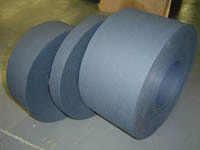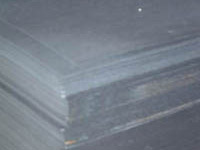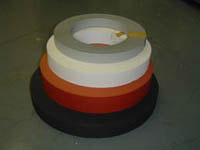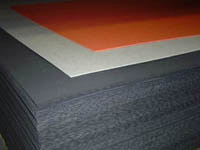ESPE Manufacturing Co., Inc. offers a wide selection of vulcanized fibre and fishpaper products. Both of these materials have broad uses across numerous industries where electrical insulation is required. This page will explain the differences between vulcanized fibre and fishpaper, including their respective properties and applications.
What Is Commercial-Grade Vulcanized Fibre?
View our catalog & Pricing
Vulcanized fibre is a chemically pure cellulose material that is environmentally friendly because it contains no adhesives or resins. It is a low-pressure laminate formed by the reaction between cotton or natural wood and a variety of chemicals like acids, bases, and zinc chloride. The reaction produces a slurry that is then flattened under heat and pressure to desired thicknesses.
Vulcanized fibre sheets can be machined, threaded, punched, formed, slit, wound, or molded into tubes for use in a variety of applications.
Characteristics & Unique Properties
Here is an overview of vulcanized fibre’s unique characteristics.
- Eco-friendly
- Versatile
- Heat-resistant
- Chemical-resistant
- Excellent electrical properties
- Semihard
- Good surface finish
- Good arc resistance
- Machinable with standard tooling
- Shock absorbent
- Tear-resistant
- Lightweight (half the weight of aluminum)
- High mechanical strength
- Cost-effective
- Available in coils and rolls for easy automated punching
Common Applications of Vulcanized Fibre
Vulcanized fibre’s mechanical strength and dielectric properties make it highly applicable in general purpose applications without special requirements. These uses can include electric motor insulation, insulating plates, appliance insulation, automotive parts, gears, gaskets, and washers.
What Is Electrical-Grade Fishpaper?
View our catalog & Pricing
Fishpaper is an electrical insulation board or paper made from vulcanized cotton. It is used to insulate electric motors, generators, and transformers, as the flexible paper can be easily cut and shaped to fit around electrical components. The word fishpaper is the generic term for electrical-grade vulcanized fibre.
Fishpaper is a dark blue material that possesses very high tensile, dielectric, and bending strength while having enough flexibility to shape to various environments. It is more resistant to cold and heat than many plastic materials.
Characteristics & Unique Properties
Here are some of the unique properties and characteristics of fishpaper.
- Lightweight
- Smooth surface
- Highly resistant to temperature
- Flexible yet durable
- Excellent dielectric properties
- Can be easily die-cut or machined
- Superior punching and forming qualities
- Available in sheets, coils, or rolls
Common Applications of Fishpaper
Fishpaper’s combination of qualities means it is fit for the production of electrical insulation products, such as armature slot insulation and circuit breakers. Fishpaper is also found in:
- Electric motors, generators, and transformers
- Electrical instruments and devices
- Electrical appliances
- Automotive parts
- Washers
- Gaskets
- Railroad track insulation
- Fuse tubes
- Lightning arresters
- Arc shields
- Coil insulation
- Motor contact bushings
Vulcanized Fibre and Fishpaper Products From ESPE Manufacturing
Fishpaper and vulcanized fibre are versatile materials used in a variety of industries, particularly for electrical insulation. At ESPE Manufacturing Co., Inc., we offer a wide selection of fishpaper and vulcanized fibre products to meet the unique needs of our customers. Feel free to view our catalog to find a product that works for you, or contact us if you have any questions.






